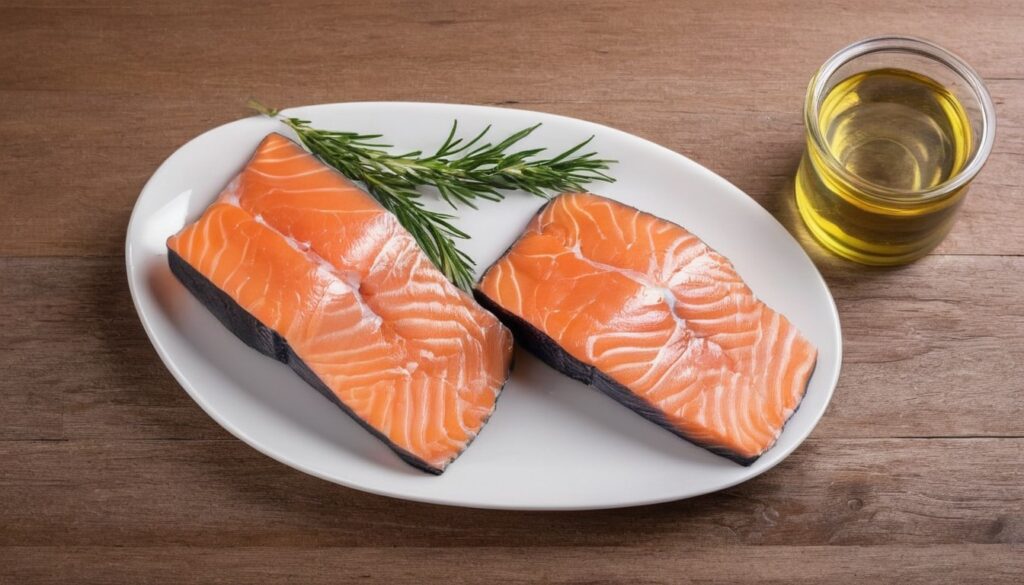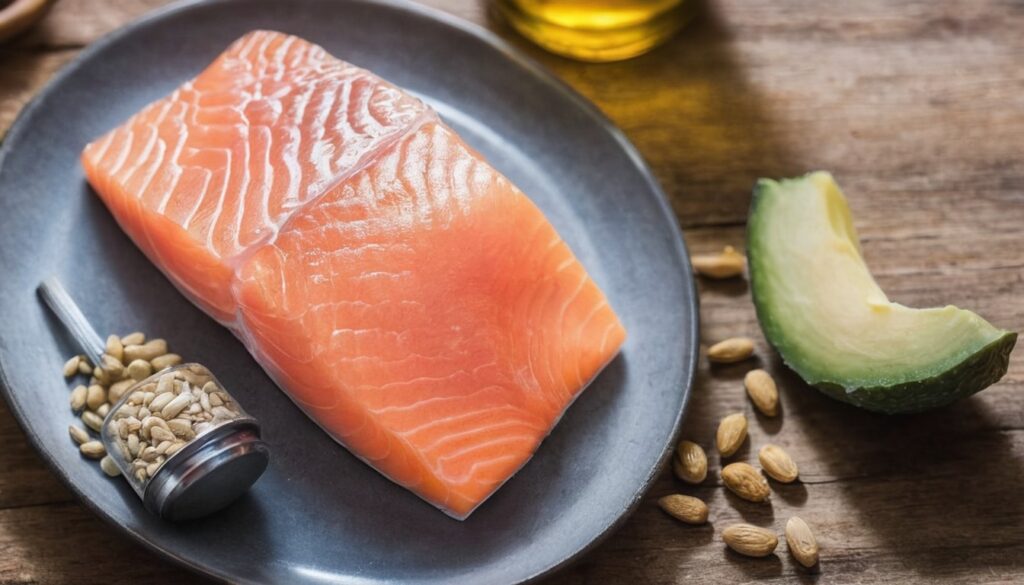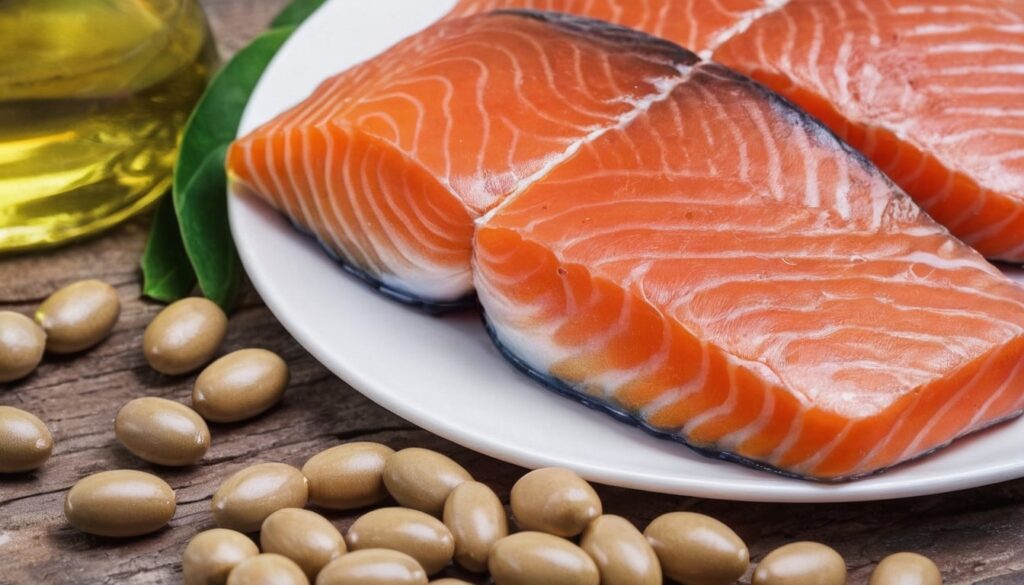Lately, the buzz around omega-3 fatty acids has been hard to ignore, with many claiming they’re superheroes in the fight against inflammation. So, what’s the deal?
In this post, we’re rolling up our sleeves to dive deep into the scientific trenches and answer a burning question: Is omega-3 really as good for anti-inflammatory purposes as they say? We’re skipping the fluff and getting straight to the facts.
No jargon or confusing terms – just a straightforward exploration of what omega-3s bring to the table when it comes to taming inflammation.
So, buckle up, because we’re about to demystify the world of omega-3 and its potential impact on inflammation. Let’s get started!

Understanding Inflammation
Alright, let’s start with the basics: inflammation. It’s not just the redness and swelling you see when you stub your toe – it’s a fundamental process in your body’s defense playbook. Inflammation is your body’s way of responding to injury, infection, or harmful stimuli.
Now, there are two main players in this inflammation game: acute and chronic. Acute inflammation is the rapid and immediate response to an injury or infection – think of it as the cavalry rushing in to deal with the threat. On the flip side, chronic inflammation is more like a persistent, low-grade simmer that can last for months or even years. It’s not the hero; it’s the villain, potentially causing more harm than good.
In the grand scheme of things, inflammation plays a crucial role in your immune system’s response. It’s like your body’s emergency crew, working to repair damaged tissues and fend off invaders. However, when inflammation goes rogue and becomes chronic, it can wreak havoc on your health. Picture this: a smoldering fire that, over time, can lead to a variety of health issues, from heart disease to autoimmune disorders.
So, inflammation isn’t all bad – it’s a vital part of your body’s defense mechanism. But when it overstays its welcome, that’s when things can get dicey. Now that we’ve got the inflammation 101 covered, let’s move on to the main event: how omega-3 fatty acids might just be the cool-headed firefighters your body needs. Stay with us!
Omega-3 Fatty Acids: A Primer
Alright, let’s talk about the rockstars of our show – omega-3 fatty acids. These aren’t just your average fats; they’re the good guys, the unsung heroes in the world of nutrition.
So, what are omega-3s? They’re a type of polyunsaturated fat that your body can’t produce on its own, meaning you’ve got to get them from your diet. Now, there are three key players in the omega-3 lineup: EPA (eicosapentaenoic acid), DHA (docosahexaenoic acid), and ALA (alpha-linolenic acid). Each has its own unique strengths and benefits.
EPA and DHA are the heavy hitters found in fatty fish like salmon, mackerel, and sardines. They’re the brainiacs of the bunch, known for their role in supporting heart health, cognitive function, and even mood regulation. ALA, on the other hand, is found in plant-based sources like flaxseeds, chia seeds, and walnuts. While ALA is essential, it’s not as potent as EPA and DHA in delivering the big health perks.
Now, where can you snag these omega-3s? Think fish (the oily kind), flaxseeds, walnuts, chia seeds, and even algae-based supplements for those steering clear of fish. These healthy fats are the VIPs of a balanced diet.
But why all the hype? Omega-3s are like the multitasking ninjas of nutrition. They’re not just there for show – they play a crucial role in heart health, help keep your brain sharp, and might even have anti-inflammatory superpowers, which brings us back to our burning question. So, grab a snack, because things are about to get interesting as we uncover the link between omega-3s and inflammation. Ready for the next chapter? Let’s roll!

The Science Behind Omega-3 and Inflammation
Now, let’s get into the nitty-gritty – the science behind how omega-3s throw down against inflammation. It’s not magic; it’s biochemistry, and it’s fascinating.
Mechanisms of Action: How Omega-3s Tackle Inflammation
Imagine inflammation as a complex biochemical dance, and omega-3s are the choreographers telling the dancers (molecules) how to move. EPA and DHA, the dynamic duo from fatty fish, don’t just sit on the sidelines; they actively participate in this dance.
These omega-3 fatty acids can be transformed into specialized pro-resolving mediators (SPMs), which, as the name suggests, help resolve inflammation. SPMs signal to the immune system that it’s time to cool off, bringing the inflammatory response back to balance. Think of it as a conductor restoring harmony to an orchestra that’s gotten a bit too enthusiastic.
Studies and Research Supporting Anti-Inflammatory Effects
But, hold on, we’re not just throwing around fancy terms without backup. Numerous studies have dived into the relationship between omega-3s and inflammation, and the results are intriguing. Research has shown that omega-3s can reduce the production of inflammatory molecules, such as cytokines and prostaglandins. In simpler terms, they put a leash on the inflammatory hounds, preventing them from causing unnecessary havoc.
Moreover, these fatty acids may also enhance the production of anti-inflammatory molecules, further tipping the scales in favor of a balanced immune response. From joint conditions to cardiovascular health, the evidence supporting the anti-inflammatory prowess of omega-3s is piling up.
The Balance Between Omega-3 and Omega-6 Fatty Acids
Now, here’s where the plot thickens. We’re not living in a vacuum – there’s another set of fatty acids called omega-6s, often found in vegetable oils and processed foods. While omega-6s aren’t inherently bad, the catch is, they have the potential to promote inflammation when not kept in check.
The key is maintaining a balance between omega-3 and omega-6 fatty acids. In the modern Western diet, the scales often tip heavily towards omega-6s, leading to an imbalance that could fuel inflammation. Omega-3s, with their anti-inflammatory properties, step in to restore equilibrium, creating a healthier environment in your body.
So, there you have it – the intricate science behind how omega-3s waltz through the inflammatory landscape. But, as we know, the devil’s in the details. What specific conditions can omega-3s help manage? Let’s find out in the next section. Keep your thinking caps on!

Conditions and Diseases with Inflammatory Components
Now that we’ve got the groundwork laid, let’s zoom in on the real-world applications – how omega-3s might be throwing a lifeline to those dealing with conditions rooted in inflammation.
Exploring Specific Conditions with Inflammatory Roots
Ever heard of rheumatoid arthritis, cardiovascular diseases, or even inflammatory bowel diseases? These aren’t just fancy medical terms; they’re conditions with inflammation at their core. Rheumatoid arthritis, for instance, involves the immune system mistakenly attacking the joints, causing inflammation and pain. Cardiovascular diseases often have inflammation as a contributing factor, leading to issues like atherosclerosis.
Rheumatoid Arthritis, Cardiovascular Diseases, and More
Now, let’s talk solutions. Can omega-3s swoop in like health superheroes and make a difference? The answer appears to be a promising yes. Studies have shown that omega-3s may help manage the symptoms of rheumatoid arthritis, reducing joint pain and morning stiffness. When it comes to the heart, these fatty acids have demonstrated their ability to lower triglyceride levels, reduce blood pressure, and potentially decrease the risk of cardiovascular events.
Can Omega-3s Play a Role in Managing These Conditions?
The science suggests that omega-3s could indeed play a crucial role in managing these conditions. Their anti-inflammatory actions seem to contribute to alleviating symptoms and, in some cases, slowing down the progression of these inflammatory diseases. While they might not be a one-size-fits-all solution, incorporating omega-3s into the treatment plan could offer additional support and benefits.
As we unravel the intricate connections between omega-3s and various health conditions, it’s becoming clearer that these fatty acids are not just a trendy supplement – they might be key players in the ongoing battle against inflammation. Now, let’s shift gears and explore how omega-3s extend their influence to another vital organ – the brain. Stick around for the cognitive revelations coming up next!
Omega-3 and Brain Health
Now, let’s turn our attention to the command center of our bodies – the brain – and the intriguing relationship it shares with omega-3 fatty acids.
The Connection Between Omega-3s and Cognitive Function
Ever wondered why fish is often referred to as “brain food”? Well, it’s not just a catchy phrase. The omega-3s, particularly DHA, are crucial components of the brain’s structure. They play a pivotal role in maintaining the integrity of cell membranes and supporting communication between nerve cells, which translates to better cognitive function.
Neuroinflammation and Its Implications
Enter neuroinflammation, where the brain’s immune system kicks into gear. While inflammation in the brain is a natural response to injury or infection, chronic neuroinflammation is associated with various neurological disorders, from Alzheimer’s to Parkinson’s disease.
Can Omega-3s Protect the Brain from Inflammation?
Here’s the exciting part – omega-3s might act as the brain’s guardians against inflammation. Research suggests that these fatty acids can mitigate neuroinflammation, potentially reducing the risk of cognitive decline and neurodegenerative diseases.
So, by fueling up on omega-3s, you’re not just giving your heart a high-five; you’re also providing your brain with the nutrients it needs to stay sharp and resilient. As we continue our journey through the omega-3 saga, we’ll wrap things up with practical tips on how to bring these mighty fatty acids into your daily routine. Stay tuned for the grand finale!

Practical Tips for Incorporating Omega-3 into Your Diet
Now that we’ve uncovered the science and potential benefits, let’s get down to the nitty-gritty of making omega-3s a regular part of your life.
Best Dietary Sources of Omega-3s
Load up on omega-3s by indulging in fatty fish like salmon, mackerel, and sardines. Not a fan of seafood? No worries – opt for plant-based sources such as flaxseeds, chia seeds, and walnuts. These nutritional powerhouses can easily find their way into salads, smoothies, or as crunchy toppings for yogurt.
Considerations for Supplementation
If you find it challenging to meet your omega-3 needs through diet alone, consider supplementation. Fish oil capsules or algae-based supplements are readily available and provide a convenient way to ensure you’re getting an adequate dose of these essential fatty acids.
Balanced Diet for Overall Health
Remember, omega-3s are just one piece of the nutrition puzzle. A balanced diet rich in fruits, vegetables, whole grains, and lean proteins is the key to overall health. Don’t forget to maintain a healthy lifestyle, including regular exercise and proper hydration, to maximize the benefits of omega-3s and support your body in the fight against inflammation.
With these practical tips, you’re well-equipped to embark on a journey towards better health through the wonders of omega-3 fatty acids. Whether you’re savoring a delicious fish dish or adding a sprinkle of flaxseeds to your morning oats, embracing omega-3s can be both enjoyable and rewarding. Here’s to a healthier, inflammation-free you!

Conclusion
In wrapping up our exploration, the scientific terrain solidly supports the potential of omega-3 fatty acids as anti-inflammatory powerhouses. Whether aiding in the management of chronic conditions or fostering brain health, these healthy fats offer a spectrum of benefits.
Yet, the individual response factor looms large, emphasizing the importance of consulting healthcare professionals. Armed with the science behind omega-3s and inflammation, individuals can navigate informed decisions, seamlessly integrating these essential fatty acids into their lifestyles for a holistic approach to health and wellness.
Here’s to embracing the omega-3 journey for a healthier, more balanced tomorrow!

Meet Author
I am a Health/Wellness and Nutrition Blogger. Bringing you well-researched details on your nutrition and health information. I love Helping you enjoy good health with the right choice of food.
Disclaimer
The information provided on this page is intended for general informational purposes only and was gathered by research on general nutrition science and experiments. The content is not intended to be a substitute for your specific professional medical, nutritional, or fitness advice, diagnosis, or treatment.
Recent Posts
- 7 Surprising Reasons Why You Need a Balanced Diet Every Day as a Woman
- The Mediterranean Diet and Dementia: Protecting Brain Health
- Superfoods for Brain Health: Diet To Fight Dementia
- Nutritional Strategies for Managing Dementia Symptoms
- How To Recognize Early Signs and Symptoms of Dementia
- Managing Lewy Body Dementia: Understanding Symptoms and Nutrition
- Understanding Vascular Dementia: Causes, Symptoms, and Dietary Solutions
- Alzheimer’s Disease and The Right Diet: All You Need To Know
- Dementia vs. Normal Aging: Debunking Myths and Clarifying Realities
- What are The Risk Factors for Dementia?
- Dementia And Omega 3 Fatty Acid ( Eicosapentaenoic acid )
- The Role of Nutrition in Dementia Prevention
- Dementia: An Introduction to the Condition and Management
- Okra Extract Supplements: A Nutrient-Rich Addition to Your Wellness Routine
- Okra and Eye Health: Okra and Vitamin A for Clear Vision
- Fuel Your Fitness: Okra’s Role in Sustaining Energy and Enhancing Muscle Recovery
- Age Gracefully with Okra: Supporting Joint Health in the Elderly
- Slim Down with Okra: Low-Calorie Smoothie Recipes
- Why Okra is a Must-Have for Pregnant Mom: The Folate Advantage
- DIY Beauty: Okra-Based Face Masks for Radiant Skin
- Boosting Milk Supply: The Okra Advantage for Nursing Moms
- Boost Your Child’s Growth with Okra: A Nutrient-Packed Superfood
- How Okra Supports Cycle Regularity: The Menstrual Miracle
- Boosting Testosterone Naturally: The Role of Okra in Men’s Health
- Detox Delight: How Okra Supports Your Body’s Natural Cleansing Process
- How Okra Fights Cancer: Okra and Cancer Prevention
- Explore 10 Health Benefits Of Garlic: A Comprehensive Guide
- Health Benefits of Garlic for Fighting Cough and Cold Infections
- Can Garlic Be Used As a Natural Antibiotic?
- How Effective is Garlic in Lowering Cholesterol And Improving Heart Health?
- Garlic’s Brain Boost: Protecting Against Alzheimer’s and Dementia
- Garlic: Your Gut’s Best Friend – Enhance Digestion Naturally
- Unveiling the Immune-Boosting Powers of Garlic
- Using Garlic to Lighten Acne Scars Naturally: Skin Nutrition
- Beating Ulcers Naturally: The Garlic Solution
- Adding Garlic to Your Athletic Nutrition Routine.
- Garlic vs. UTI: Natural Remedy for Urinary Tract Infections
- How to Combat Exercise Fatigue with Garlic: The Science Behind it
- The Power of Garlic: Safely Reducing Blood Toxicity
- Garlic: A Natural Solution for Oestrogen Deficiency
- Garlic’s Role in Osteoarthritis Management: A Natural Remedy for Joint Health
- Platelet Power: Garlic’s Role in Preventing Heart Blockages
- Harnessing Garlic’s Power: 5 Health Benefits You Need to Know
- Unlocking the Secrets of Garlic in Preventing Thromboembolism
- Unlocking Garlic’s Potential: A Natural Approach to Lowering Blood Pressure
- Boosting Men’s Wellness: The Power of Garlic
- Explore The Incredible Benefits of Garlic for Women’s Health
- Treating Throat Disorders Naturally with Papaya
- Can Papaya Be Used Treatment For Ringworm?
- Can Cucumber Reduce the Risk of Cancer?
- Using Cucumber to Reduce Puffiness Around The Eyes.
- Using Cucumber For a Better Skin: Beauty Benefits of Cucumber.
- Are Cucumbers Helpful in Weight Loss?
- Can Cucumber Help Reduce Blood Sugar and Manage Diabetes?
- How can I improve my digestion with Cucumber?
- Unveiling Cucumbers’ Secrets for Hair and Nails: From Salad Bowl to Beauty Regimen
- Can Papaya Help Treat Piles? Hemorrhoids Natural Relief.
- Refreshing Solutions: Cucumbers for Bad Breath.
- Can Cucumber Help Regulate Blood Pressure?
- Cucumber: A Good Choice for Hydration and Detoxification
- How Papaya Can Help Reduce Lung Inflammation: Insights and Practical Tips
- Seniors’ Secret Weapon: Harnessing Cinnamon’s Health Benefits
- Transform Your Routine: Cinnamon for Beauty
- Discovering the Benefits of Cinnamon for Oral Hygiene
- Boost Your Workout: How Cinnamon Fuels Athletes.
- Unlocking the Weight Loss Potential of Cinnamon: A Comprehensive Guide
- Let’s Discuss Cinnamon Consumption During Pregnancy.
- Spicing Up Motherhood: Cinnamon Benefits for Nursing Moms
- Spice Up Your Child’s Diet: Fun Ways to Include Cinnamon in Meals
- Cinnamon: A Natural Remedy for Women’s Menstrual Health
- Using Cinnamon as a Natural Aphrodisiac: The Role of Cinnamon in the Infertility treatment and Sexual drive.
- Can Cinnamon Be Used in Treating Erectile Dysfunction?
- Can Eating Papaya Help Prevent Arthritis?
- Does papaya have Anticancer Effects?
- Can papaya Aids Digestion?
- Can Papaya Seeds Help Heal Wounds?
- How To Use Okra To Lose Weight and Reduce Belly Fat.
- How To Use Okra to Improve Capillaries Function.
- Can Okra Help Maintain a Healthy Heart and Prevent Heart Disease?
- Can Okra Help Prevent Constipation?
- How Can Okra Help Get Rid of Cholesterol?
- Can Okra Help Stabilize Blood Sugar and Prevent Diabetes?
- The Beauty Benefits of Okra for Hair, Skin, and Nails.
- How Okra Can Boost Women’s Health and Wellness.
- How Okra Can Boost Men’s Health: Unlocking the Nutritional Power of this Versatile Vegetable
- Different Ways to Include Okra to Your Diet
- Okra: Your Delicious Pathway to Vibrant Health and Culinary Delight!
- How Does Eating Papaya Boost Immunity?
- Preventing Macular Degeneration with Papaya. : Maintaining A Healthy Eye Vision
- Can Papaya Promotes Cardiovascular Health?
- How To Use Papaya To Condition Your Hair.
- Can Papaya Help in Controlling Dandruff?
- Can Papaya Stimulates Hair Growth?
- The Cognitive Benefits of Cloves for Brain Health.
- Can Cloves Alleviate Menstrual Discomfort and Regulate Menstrual Cycles?
- How To Use Papaya To Reduce Under-Eye Dark Circles.
- Can Papaya Help Reduce Skin Wrinkles?
- Can Papaya Help Clears Skin Pigmentation?
- Can Papaya Help Moisturize Dry Skin?
- Can Papaya Help Treat Eczema And Psoriasis?







